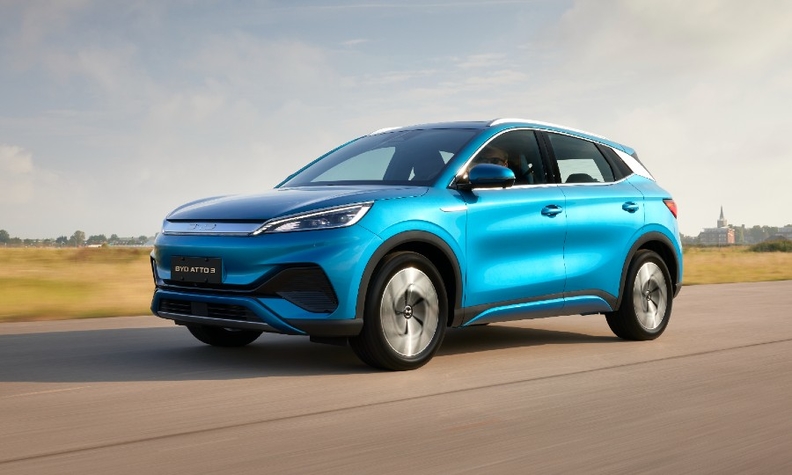With one daughter and another on the way, the Bentvelsens were in the market for a roomier car.
Jerry, 34, grows cucumbers in Rotterdam and was familiar with China’s largest electric-vehicle maker from the family business using its commercial trucks.
Next week, he and his wife Jessica, 33, take delivery of a black BYD Tang, having been won over by a test drive in the seven-seat SUV that gets from 0-100 kph (62 mph) in 4.6 seconds.
If there were any doubts left that the company known for landing a major investment from Warren Buffett’s Berkshire Hathaway has arrived on the world stage, the handover of keys to the Bentvelsens and BYD’s other European customers during this week’s Paris auto show put them to rest.
The world’s third-most-valuable automaker — behind Tesla and Toyota, and ahead of newly public Porsche — looks to be the frontrunner among Chinese challengers that roughly matched up with the number of western brands in attendance.
In its bid to enter Europe, BYD will initially sell three full-electric passenger vehicles in six European countries. The Atto 3, a compact crossover, will be sold for 38,000 euros ($36,480), while two midsize models, the Tang SUV and the Han sedan, have been priced at 72,000 euros. A second, as yet unpriced sedan, the Seal, will be added later. BYD is also mulling adding a small car, the Dolphin to its Europe lineup.
And BYD is doing more than just putting on a good show. It’s drawing interest from governments in central and southern Europe that are eager to land investment from the company, which is contemplating manufacturing cars locally as relationships between China and western countries that are threatened by its rise turn increasingly fraught.
“Some of the countries are very detailed,” Michael Shu, general manager and managing director of BYD Europe, said of offers it’s getting to help address the company’s needs for labor, land, energy, construction and an ecosystem of nearby suppliers.
“Even in China, we do not have such a kind of investing in the service.”
Red carpet welcome
Automakers led by Stellantis, Europe’s second largest, are on edge about the friendly reception their potential disruptors are getting on their home turf.
“Chinese manufacturers are welcomed in Europe with a red carpet,” Carlos Tavares, CEO of Stellentis, told reporters in Paris. “It’s not like this that we are welcomed in China.”
“It’s disturbing,” said Laurens van den Acker, director of design for Renault group.
“I root for Europe. I want it to be us taking the leadership. Chinese automakers have an advantage over us, and the Chinese government has been betting on EVs for 15 years.”
Other automakers have fared better having made bargains decades ago in China, agreeing to set up compulsory joint ventures with domestic manufacturers to share in what was a jaw-dropping period of meteoric growth.
Some of those western companies, including Volkswagen Group and General Motors, built massive positions in the market that have started to deteriorate the last few years, as local players field attractive electric models.
“The competitive intensity is increasing,” Mercedes-Benz CEO Ola Kallenius said in an interview.
“It’s the most fun time to work in automotive since 1886,” he added, referring to the year Carl Benz rolled out the first car powered by a gas engine. “It’s also the most uncertain time.”
While some governments are offering a helping hand, President Emmanuel Macron is prepared to play defense. His government is preparing a measure to subsidize EVs only if they are made in France, or at least in Europe.
The policy, which appears to take a page from the Inflation Reduction Act recently signed into law in the US, may only make it more likely that China’s most well-off automakers look to manufacture in Europe.
On top of BYD, this could include Great Wall Motor, whose small Ora Funky Cat EV with retro looks to live up to its name was among the models the company is staging in Paris.

The BYD Atto 3 compact crossover will be the automaker’s entry-level model in Europe and will cost 38,000 euros.
Great Wall is about to start building electric Mini hatchbacks with BMW in China. A next step could be to make cars together at Mini’s home plant just outside Oxford, England, which will cease making electric Minis for at least the next several years.
Whether by leveraging partnerships with companies consumers know, or in BYD’s case, an existing presence in commercial vehicles and buses, China’s automakers look poised as ever to overcome the qualms European car buyers have had in the past about making a big-ticket purchase from a new entrant.
“We know BYD,” Jerry Bentvelsen said, when asked whether he had any second thoughts about becoming one of the first in the Netherlands to take delivery of the company’s cars. “I do not have reservations.”
